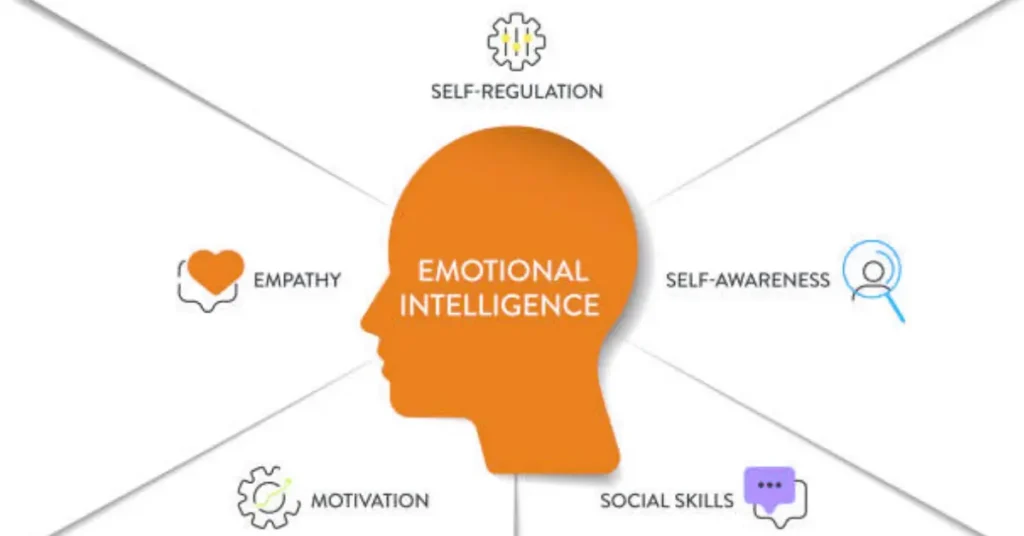Soft Skills: What They Are, Why They Matter, and How to Improve Yours
The Importance of Soft Skills in Digital Entrepreneurship
In today’s fast-paced world of digital entrepreneurship, technical skills like coding, digital marketing, and data analysis are undoubtedly important. However, what often sets successful entrepreneurs apart is their ability to work with others, adapt to challenges, and communicate effectively. These qualities—collectively known as soft skills—are just as crucial for success.
Soft skills like emotional intelligence, leadership, and teamwork are essential for building strong relationships, managing a remote team, and making decisions that drive business growth. While hard skills can get you the job, it’s your soft skills that will help you lead with empathy, collaborate efficiently, and navigate complex problems in innovative ways.
In this article, we’ll explore why soft skills are vital in digital entrepreneurship, how they differ from hard skills, and provide actionable steps to develop them. Whether you’re managing a startup, working in a freelance capacity, or growing your online business, investing time in honing your soft skills will pay off in better business outcomes and stronger professional connections. Let’s dive in and understand how these vital skills can elevate your career and business success.
What Are Soft Skills?

Disclosure: This post may contain affiliate links, meaning if you decide to make a purchase via my links, I may earn a commission at no additional cost to you.
Soft skills are the personal attributes, habits, and traits that shape how you interact with others, manage tasks, and approach challenges in both your personal and professional life. Unlike hard skills, which are specific, teachable abilities such as coding, graphic design, or data analysis, soft skills are more about your behavior and how you relate to people and situations.
These skills are also known as interpersonal, people, or emotional intelligence skills. They influence how you communicate, collaborate, and handle conflict. While hard skills can be easily quantified, soft skills are more subjective and often take time and practice to develop.
Key Traits of Soft Skills:
- Communication: This includes both verbal and written communication, ensuring that you convey information clearly and effectively. Good communicators are able to express ideas and information in ways that are easy to understand and engaging.
- Emotional Intelligence: This refers to the ability to recognize, understand, and manage both your emotions and the emotions of others. Entrepreneurs with high emotional intelligence can navigate stressful situations with empathy, remain calm under pressure, and build stronger relationships.
- Adaptability: The ability to adjust to new circumstances and challenges. In the ever-evolving digital world, adaptability allows entrepreneurs to stay ahead of market trends and adjust strategies accordingly.
- Teamwork: Whether you’re working with colleagues, clients, or customers, the ability to work collaboratively is essential. Entrepreneurs must be able to foster a positive work environment, delegate tasks effectively, and leverage the strengths of their team.
- Problem-Solving: The ability to approach complex problems with creative solutions. This skill is especially valuable in entrepreneurship, where unexpected challenges often arise.
Why Soft Skills Matter:
Soft skills are critical in the digital entrepreneurship world because they influence how you lead, communicate, and build relationships with others. They help you manage your time, deal with stress, motivate yourself and others, and navigate complex business situations. While technical abilities may open the door, it’s your soft skills that allow you to thrive once you’re inside.
Below are some key examples of soft skills that can make a real difference in your digital business journey:
1. Communication Skills

Effective communication is the foundation of any successful business. This includes both verbal and written communication, as well as the ability to actively listen. Whether you’re writing emails, presenting ideas to clients, or leading meetings, clear communication ensures your message is understood. Good communication also involves adjusting your tone and language depending on your audience.
- Why it matters: It helps build trust with clients, manage expectations, and prevent misunderstandings. In the digital space, clear communication can make or break client relationships.
2. Teamwork and Collaboration

Even as a digital entrepreneur, collaboration is essential. Whether you’re managing a remote team or working with freelancers, being able to collaborate effectively is crucial. Teamwork requires a willingness to listen to others, provide constructive feedback, and contribute to group goals.
- Why it matters: Successful collaboration fosters creativity, innovation, and better problem-solving. Strong teamwork leads to higher productivity and a more enjoyable work environment.
3. Problem-Solving

Entrepreneurs face countless challenges, whether related to finances, marketing strategies, or client satisfaction. Problem-solving involves analyzing issues, thinking critically, and finding creative solutions. Being able to approach challenges with a clear mindset is essential for overcoming obstacles that arise in business.
- Why it matters: Quick, effective problem-solving allows you to maintain momentum and continue delivering results. It also helps you innovate and adapt your business strategies as needed.
4. Time Management

In the digital world, especially for entrepreneurs, time is often one of the most limited resources. Effective time management allows you to prioritize tasks, set deadlines, and stay organized. Tools like project management software, to-do lists, or time-blocking techniques can help streamline your daily routine.
- Why it matters: Good time management ensures you meet deadlines, stay productive, and avoid burnout, making it easier to scale your business and maintain work-life balance.
5. Adaptability

In the ever-changing digital landscape, being adaptable is crucial. The ability to pivot your strategy, embrace new technologies, or adjust to unexpected challenges can determine the success or failure of your business.
- Why it matters: Entrepreneurs who adapt to change stay competitive, quickly seize new opportunities, and can navigate the fluctuating demands of the market.
6. Emotional Intelligence

Emotional intelligence (EI) is the ability to recognize and manage your emotions while understanding others’ emotions. In business, high EI enables you to manage stress, resolve conflicts, and build strong, positive relationships.
- Why it matters: EI helps entrepreneurs lead with empathy, manage pressure, and engage with clients and teams in a thoughtful and considerate way, ultimately strengthening relationships and improving outcomes.
7. Leadership Skills

Leadership isn’t just about managing a team; it’s about inspiring others, setting a clear vision, and motivating people to work toward a common goal. Leadership skills also include delegating effectively, providing feedback, and making important decisions.
- Why it matters: Strong leadership fosters a productive, motivated team and can drive business growth. Even if you’re a solo entrepreneur, leadership skills help you stay focused on your goals and inspire others.
8. Conflict Resolution
Conflict is inevitable in any workplace or business environment. Being able to manage and resolve conflicts efficiently is key to maintaining a harmonious, productive atmosphere. Conflict resolution involves listening to all parties, understanding differing perspectives, and finding a compromise or solution.
- Why it matters: Effective conflict resolution ensures that misunderstandings don’t escalate, keeping your team and clients satisfied and minimizing disruptions to your workflow.
By cultivating these soft skills, you’ll improve not only your work habits but also your relationships with clients, colleagues, and partners, positioning yourself for long-term success in the digital entrepreneurship world.
Soft Skills vs Hard Skills

In the world of digital entrepreneurship, it’s important to understand the difference between soft skills and hard skills. While both are essential for career success, they serve distinct purposes. Knowing how they complement each other can help you prioritize the right skill sets for different tasks and stages in your business.
What Are Hard Skills?
Hard skills are specific, teachable abilities that can be measured and quantified. They include technical proficiencies, certifications, and knowledge required to perform particular tasks in a job or business. For example, digital marketing knowledge, programming languages, SEO expertise, and graphic design are all hard skills. These skills can be learned through education, courses, or on-the-job training and are often validated through tests or certifications.
What Are Soft Skills?
Soft skills, on the other hand, are personal traits and interpersonal abilities that influence how effectively you interact with others, solve problems, and manage tasks. They are harder to measure and typically take longer to develop. Examples include emotional intelligence, communication, leadership, and adaptability. While hard skills are often job-specific, soft skills are universal and can be applied across various industries and situations.
Key Differences Between Soft and Hard Skills
- Nature: Hard skills are specific and technical (e.g., coding, data analysis), while soft skills are general and interpersonal (e.g., communication, leadership).
- Learnability: Hard skills are often easier to teach and assess because they can be directly measured. Soft skills, however, are typically learned through experience and personal development.
- Application: Hard skills are used to complete technical tasks and produce tangible results. Soft skills influence how you work with others, manage yourself, and navigate complex situations.
- Evaluation: Hard skills are often assessed through exams, certifications, or practical demonstrations, while soft skills are more subjective and typically evaluated through observation or feedback.
Why Both Matter for Digital Entrepreneurs
While hard skills are necessary to execute specific tasks, soft skills are crucial for creating a sustainable business environment. In digital entrepreneurship, technical abilities can get you through the day-to-day tasks, but soft skills are what will help you build strong client relationships, manage teams effectively, and adapt to an ever-changing market.
For example, a skilled SEO specialist (hard skill) will perform better if they can communicate their findings clearly to clients and teams, manage stress effectively, and work collaboratively (soft skills). A balance of both soft and hard skills enables digital entrepreneurs to thrive in both technical and interpersonal areas, leading to long-term success.
Understanding how to cultivate and leverage both types of skills will help you become a more well-rounded entrepreneur and enhance your ability to adapt to different situations in your business.
Best Soft Skills for Resume
When it comes to crafting a standout resume, showcasing your soft skills can set you apart from other candidates. Employers want to see not only that you have the technical know-how but also that you have the personal attributes necessary to thrive in a dynamic work environment. Including the right soft skills on your resume can demonstrate your ability to succeed in digital entrepreneurship and contribute effectively to any team.
Top Soft Skills to Include on Your Resume
1. Communication Skills
Clear communication is one of the most sought-after soft skills by employers. Whether it’s conveying ideas to a team, presenting to clients, or responding to customer inquiries, the ability to communicate effectively is essential. Include examples where you’ve written reports, delivered presentations, or negotiated deals.
- Example: “Successfully led client meetings, providing clear, concise reports and presentations, resulting in a 25% increase in client satisfaction.”
2. Teamwork and Collaboration
Even if you’re working on your own as a digital entrepreneur, collaboration with clients, partners, or freelancers is key. Being able to work in a team, share ideas, and contribute to collective goals is crucial. Highlight experiences where you worked closely with others to achieve business success.
- Example: “Collaborated with a cross-functional team of developers and designers to launch a new website, which increased traffic by 40% in the first quarter.”
3. Leadership and Initiative
If you’ve had any experience leading a team or taking initiative on a project, this is a great soft skill to highlight. Employers value individuals who can take charge and make decisions when needed, as well as those who can motivate and guide others.
- Example: “Led a team of five marketing professionals to create a digital campaign that generated 30% more leads than previous efforts.”
4. Time Management
With the fast-paced nature of digital entrepreneurship, effective time management is crucial. Employers want to know you can prioritize tasks, meet deadlines, and stay organized. Make sure to provide examples where your time management directly impacted project outcomes.
- Example: “Used time-blocking techniques to manage daily tasks, resulting in a 20% increase in productivity and on-time project delivery.”
5. Problem-Solving
The ability to think critically and come up with creative solutions to challenges is a valuable soft skill. Whether it’s fixing a website issue or handling a dissatisfied client, problem-solving skills show you can adapt to change and tackle problems head-on.
- Example: “Resolved a major client issue by identifying the root cause and implementing a solution that increased retention by 15%.”
6. Adaptability
In the ever-changing world of digital entrepreneurship, adaptability is essential. Employers look for individuals who can stay flexible and open-minded when new challenges or opportunities arise. Be sure to show how you’ve embraced change or quickly learned new tools or processes.
- Example: “Adapted to a new project management software, streamlining team communication and improving project delivery times by 20%.”
7. Emotional Intelligence (EI)
Emotional intelligence is the ability to understand, manage, and express your emotions, as well as perceive and influence the emotions of others. In leadership and client-facing roles, EI is crucial. Demonstrating your ability to stay calm under pressure and build rapport with clients will make you stand out.
- Example: “Handled high-stress situations with calm and empathy, ensuring clients felt heard and valued, which improved customer satisfaction by 30%.”
How to Showcase Soft Skills on Your Resume
Simply listing soft skills isn’t enough; you must provide examples that demonstrate how you’ve used these skills in real-world situations. Instead of just saying “good communicator,” highlight times when your communication led to positive outcomes. Use metrics and results wherever possible to give context to your achievements.
- Tip: Tailor your soft skills to match the job description. If the role requires strong teamwork, focus on your experience working with teams. If leadership is emphasized, highlight any managerial or project-leading experience.
Including these essential soft skills on your resume will show potential employers that you’re not just technically capable but also equipped to navigate the interpersonal and organizational aspects of a digital business. These skills can be the key to unlocking more opportunities and advancing your career.
Soft Skills for Job Interviews
When you’re preparing for a job interview, hard skills like coding, marketing expertise, or technical proficiency are often the focus. However, soft skills are just as important—sometimes even more so. Employers want to know if you have the interpersonal qualities, problem-solving abilities, and emotional intelligence to fit in with their team and thrive in their work environment. Here’s how to demonstrate your soft skills during an interview and make a lasting impression.
1. Demonstrating Communication Skills
One of the most important soft skills to showcase in an interview is your ability to communicate clearly and effectively. Strong communicators are able to articulate their ideas, listen actively, and adapt their messaging based on the situation.
- How to demonstrate it: Be concise and clear when answering questions, and make sure to listen attentively to the interviewer’s questions. Ask follow-up questions to show engagement and ensure you understand what’s being asked.
- Example: If the interviewer asks about your experience with a project, share a brief but detailed story that outlines the challenge, your approach, and the results. This shows that you can communicate ideas clearly, while also providing tangible evidence of your experience.
2. Showcasing Problem-Solving Abilities
Problem-solving is a key skill for any digital entrepreneur, and employers want to see that you can tackle challenges and think critically. In interviews, you may be asked to describe a time when you solved a difficult problem.
- How to demonstrate it: Use the STAR method (Situation, Task, Action, Result) to frame your responses. By providing specific examples of how you’ve tackled problems in the past, you’ll show that you can handle the unknowns of the job.
- Example: “In my last role, I was faced with a sudden change in client requirements. I analyzed the situation, restructured our approach, and delivered the project on time, which helped the client meet their launch deadline.”
3. Highlighting Teamwork and Collaboration
Even if you’re applying for a solo role, employers want to know you can work well with others. Most businesses rely on teams to drive innovation and complete projects. Showing that you can collaborate effectively will set you apart.
- How to demonstrate it: Share examples where you worked successfully as part of a team. Talk about how you managed differing opinions or contributed to the group’s success. It’s important to show that you’re a team player, open to feedback, and able to support others.
- Example: “In my previous role, I collaborated with a cross-functional team on a product launch. Despite differing opinions, I facilitated open discussions that allowed us to find common ground and deliver a successful campaign.”
4. Demonstrating Emotional Intelligence (EI)
Emotional intelligence is the ability to understand, control, and express your emotions, as well as recognize and influence the emotions of others. This is a valuable skill for working in teams, managing clients, and handling conflict.
- How to demonstrate it: Show empathy during the interview by listening carefully and responding thoughtfully. If you discuss a challenge, highlight how you managed emotions—whether your own or others—to resolve the situation constructively.
- Example: “When working with a frustrated client, I took the time to listen to their concerns, validated their feelings, and reassured them that we would work together to find a solution. This helped maintain a strong, positive relationship.”
5. Showing Adaptability
Digital entrepreneurship requires the ability to quickly adapt to new trends, tools, and environments. Employers want to know you’re flexible and can pivot when necessary.
- How to demonstrate it: Discuss how you’ve managed change in the past—whether it’s adapting to new technology, a change in job responsibilities, or a shift in the industry. Show that you thrive in dynamic environments.
- Example: “When our company transitioned to a new project management tool, I took the initiative to learn the platform, created training materials for the team, and helped everyone transition smoothly.”
Tips for Preparing Soft Skills for Interviews
- Practice: Before your interview, practice responding to behavioral questions that highlight your soft skills. Use the STAR method to craft structured responses.
- Be Authentic: Don’t try to sound overly rehearsed. Interviewers appreciate authenticity, so be sure to share real stories that reflect your experiences.
- Be Self-Aware: Demonstrating soft skills requires self-awareness. Reflect on your strengths and areas for improvement, and be ready to discuss how you’ve worked on developing them.
While hard skills can land you an interview, it’s your soft skills that will help you shine and get hired. By demonstrating effective communication, problem-solving abilities, emotional intelligence, and adaptability, you can show that you are not only capable of doing the job but also of thriving in the workplace culture and contributing to the team’s success. Prepare well, practice your responses, and go into your interview with confidence—your soft skills will do the rest!
How to Develop Soft Skills
Developing soft skills is a gradual process that requires consistent effort and a willingness to grow. Unlike hard skills, which can often be acquired through structured learning, soft skills are honed through experience, self-awareness, and reflection. Whether you’re a digital entrepreneur, a freelancer, or climbing the corporate ladder, improving your soft skills will have a significant impact on your professional success.
Here’s how you can actively work on enhancing your soft skills:
1. Practice Active Listening
Active listening is the foundation of good communication, and it’s an essential soft skill for building relationships and understanding others. To improve your listening skills:
- Focus fully on the speaker: Avoid distractions like checking your phone or thinking about your response while the other person is speaking.
- Ask clarifying questions: Make sure you fully understand the message by asking questions that delve deeper into the speaker’s point.
- Reflect and summarize: After someone finishes speaking, paraphrase what they said to ensure you’ve understood correctly.
The more you practice active listening, the better you’ll communicate, collaborate, and resolve conflicts.
2. Take Leadership Opportunities
Even if you’re not in a leadership role, there are plenty of opportunities to develop leadership skills. You can take on leadership tasks in group projects, volunteer to manage team activities, or mentor a junior colleague. Leadership is about inspiring and motivating others, making decisions, and setting clear goals.
- Learn how to give feedback: Constructive feedback is vital for growth. Practice giving feedback that’s both encouraging and solution-oriented.
- Empower others: A good leader knows how to delegate tasks and trust others to get things done, which helps build confidence within your team.
Start by taking small steps, such as organizing team meetings or initiating new projects, and gradually work your way toward more significant leadership responsibilities.
3. Build Emotional Intelligence (EI)

Emotional intelligence is one of the most important soft skills in today’s workplace. It involves understanding your own emotions and how they affect your thoughts and behavior, as well as recognizing emotions in others and handling interpersonal relationships judiciously and empathetically.
- Self-awareness: Reflect on your emotions and how they impact your actions. Journaling or mindfulness practices can help you stay in tune with your feelings.
- Empathy: Put yourself in others’ shoes to understand their emotions and reactions. Empathy helps you connect with colleagues, clients, and customers on a deeper level.
- Self-regulation: Learn to manage your emotions, especially in stressful situations. Practice techniques like deep breathing or taking a pause before reacting to negative emotions.
As you develop higher emotional intelligence, you’ll see improvements in conflict resolution, collaboration, and leadership.
4. Improve Time Management
Time management is a critical soft skill for any entrepreneur, as it helps you stay organized and productive. Good time management ensures that you meet deadlines and balance your work-life commitments effectively.
- Use tools: Leverage time-management apps or planners to track your tasks and deadlines.
- Prioritize tasks: Learn how to identify urgent versus important tasks and prioritize them accordingly.
- Set goals: Break down large tasks into smaller, manageable steps. Set realistic deadlines and track your progress.
By mastering time management, you’ll increase your productivity, reduce stress, and have more time for creativity and innovation in your business.
5. Practice Adaptability
The digital world is constantly evolving, so adaptability is a crucial soft skill for staying relevant. Adapting to new tools, market changes, or job responsibilities is essential for long-term success.
- Be open to learning: Embrace new learning opportunities. Enroll in online courses, attend webinars, or read industry blogs to stay informed about new trends.
- Be flexible with your approach: When a project doesn’t go as planned, be willing to pivot and try a new solution.
- Stay positive: Adaptability isn’t just about being flexible—it’s also about maintaining a positive attitude when facing change or uncertainty.
The more flexible and open-minded you are, the better you’ll handle unexpected changes in the marketplace or your business.
6. Seek Feedback and Self-Reflect
Developing soft skills doesn’t happen in isolation; seeking feedback from others is a great way to identify areas for improvement. Ask colleagues, mentors, or friends for constructive criticism, and be open to their suggestions.
- Reflect on your progress: Regularly take time to reflect on your soft skill development. What’s working? What could be improved? Adjust your approach accordingly.
- Set specific goals: Create clear, measurable goals for developing each soft skill. Track your progress over time and celebrate your achievements.
7. Learn from Others
Observe how people you admire handle situations, especially in leadership or challenging environments. This can provide valuable insights into improving your own behavior and soft skills.
- Mentorship: Having a mentor can be a huge asset in developing soft skills. A mentor can give you guidance, share their experiences, and provide you with practical tips for improving your skills.
Developing soft skills is not something that happens overnight. It takes consistent effort, self-awareness, and a commitment to growth. By practicing active listening, taking leadership opportunities, building emotional intelligence, improving time management, and embracing adaptability, you’ll be well on your way to strengthening your soft skills. These skills will not only make you a more effective digital entrepreneur but will also open up greater opportunities for success in your personal and professional life.
Start today by focusing on one or two soft skills and incorporate them into your daily routine. Over time, you’ll notice how these skills enhance your ability to build meaningful relationships, solve problems, and succeed in the ever-evolving digital landscape.
Embrace Soft Skills for Career Success
In the fast-paced world of digital entrepreneurship, technical expertise will get you far, but it’s your soft skills that will truly set you apart. Whether you’re leading a team, managing clients, or navigating new challenges, strong communication, emotional intelligence, and adaptability are critical for long-term success.
By actively developing and refining these skills—through practice, feedback, and self-reflection—you can build deeper professional relationships, enhance your leadership abilities, and adapt more effectively to an ever-changing market. Remember, soft skills are not innate; they can be cultivated over time with intentional effort.
As you continue to grow in your career, make soft skills a priority. Not only will they help you thrive in your current role, but they will also open doors to new opportunities and help you build a more sustainable and successful business. Start today—embrace soft skills, and watch your career flourish.
FAQ Section:
- What are the most important soft skills for digital entrepreneurs?
The most important soft skills include communication, adaptability, emotional intelligence, time management, and leadership. These skills help entrepreneurs build effective teams, manage projects, and connect with customers. - How can I improve my soft skills for a job interview?
Practice demonstrating your soft skills in real-life scenarios, such as through mock interviews. Show examples of how you’ve collaborated with teams, solved problems, and handled conflicts. - Can I list soft skills on my resume without evidence?
It’s essential to back up soft skills with concrete examples. Instead of simply listing them, provide proof of how you’ve used them to achieve results or overcome challenges.
Where to Learn These Skills
You don’t need to enroll in a 4-year program. Try:
- Coursera (certified programs from top universities)
- LinkedIn Learning
Many of these platforms offer certificates, practice projects, and eve

I’m Olivia Blake, the voice behind Job Boost 4U. I help people like you land better jobs and earn online with practical, honest tips.
Read more…




